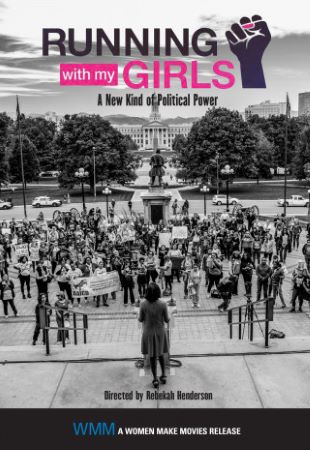
Running With My Girls 2021
Distributed by Women Make Movies, 115 W. 29th Street, Suite 1200,New York, NY, 10001; 212-925-0606
Produced by Tan Tigress Productions and Sarah McKellogg Lane
Directed by Rebekah Henderson
Streaming, 97 mins
High School - General Adult
Denver; Democracy; Urban Areas; Women's History
Date Entered: 10/13/2022
Reviewed by Michael Pasqualoni, Librarian for Public Communications, Syracuse University LibrariesRunning With My Girls is a strong debut feature length documentary from Rebekah Jones. Jones personalizes the campaign trail struggles faced by an inspirational set of progressive women of color who dive into the 2019 election contests for Denver mayor and several city council seats. This is a view of successful and unsuccessful campaigns from the perspective of those who challenge establishment candidates and the power structures associated with access to corporate campaign dollars. Gentrification and dwindling access to affordable housing underpins much of the narrative, as does a legacy of racial privilege, domestic violence, and homelessness, problems several candidates have experienced first-hand. Jones injects a candid filmmaker’s voice, employing approachable grassroots filmmaking that fits these insurgent candidacies. The score by Kyle Jones is a stand-out.
While not dismissive of overall strengths, there are a few missed opportunities in the cinematography here to expand further visualizations for districts in Denver where the election battles play out. Perhaps a few alternative editing choices that would have added a bit more sense of place to the asserted sense of persons that are so well conveyed. There are also minor potential weaknesses for more scholarly viewers investigating local U.S. electoral politics, or for community activists with plans to pursue similar success we see exemplified here when victorious Candi CdeBaca joins the Denver City Council on behalf of District 9 as its first ever, and also youngest, LGBTQ Latina.
There seems an intentional and relative lack of closer coverage of managerial mechanics for running the campaigns administratively, at times pushing their efforts forward on a shoestring. The film’s personality profile emphasis also makes it lighter on sharing in greater depth the political philosophies and literal campaign messaging voters experienced. Aside from shots of campaign signage and the optics of the candidates appearing at community fora or press club debates, those gaps also include a rather light coverage of the philosophies and political platforms of those the women in the film are out to defeat. Coverage of the current officeholders zeros in mainly on their weaknesses. Dr. Lisa Calderon does speak to these nuances most eloquently near the wrap-up of the film, in her eventual unsuccessful quest to unseat incumbent Mayor Michael Hancock.
Running With My Girls is recommended with reservations. There is some uncertainty over time of the appeal of a feature length work some years hence when focus is upon the personal aspects of campaign trail candidate psychology for enduring the horse race element of elections, particularly for viewers not part of the Denver community. The lack of a scholarly approach may also make this sort of film title of uncertain appeal in college or university settings, with passage of time, if an objective of the viewer is to study U.S. local elections in a generalized sense, or academic scrutiny of incumbency advantage. In the present moment, immediate local appeal of this documentary to Denver is probable however, given that another election cycle looms in 2023, one that will feature some of the persons appearing in this film. As Mayor Hancock reaches his three-term limit, a crowded field of candidates is expected to once again hammer home getting a woman voted in as mayor, which would be a first for that city, and discussions of tackling the problems of homelessness in Denver will invariably once again be central.
Where this film has its strongest appeal is for those with an interest in the candidate perspectives of challengers in grassroots U.S. municipal election campaigns, and the effort to increase representation of women and members of traditionally marginalized communities as local government office holders. A sizeable percentage of American cities have never had a female mayoral incumbent. Running With My Girls offers relevance as well for those working within LGBTQ studies, or exploring policy challenges in the United States tied to urban gentrification. Above all, students of Denver, Colorado municipal government and history, including those from other cities investigating Denver as a comparative model, should consider having this title in their library or curriculum. Its immediate appeal to all Coloradans is clear.
Published and licensed under the Creative Commons Attribution 4.0 license. Anyone can use these reviews, so long as they comply with the terms of the license.